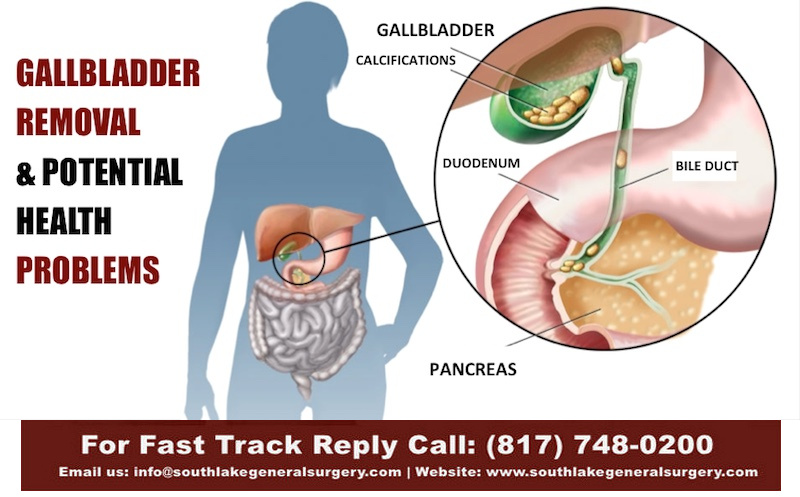Gallbladder is a pear-molded organ that stores bile, the liquid that helps digest food. If it’s not functioning the way in which it should (or bile moves out of balance), hard sections begin to frame. These can be as little as a grain of rice or as large as a golf ball.
Gallstones don’t leave all alone. If they begin to damage or cause different symptoms, your PCP may choose to remove gallbladder. This kind of surgery is known as a cholecystectomy. It’s one of the most widely recognized surgeries specialists perform.
About 80% of individuals who have gallstones will require surgery.
Types of Gallbladder Surgery
There are two ways at Southlake General Surgery Hospital that can remove gallbladder:
Open Surgery
Under open surgery, surgeon will make a 5-to 7-inch incision (cut) on your tummy to remove gallbladder. You’ll require open surgery if you have a bleeding issue. You may likewise require it, if you’ve serious gallbladder issues, are extremely overweight, or are in your last trimester of pregnancy.
Laparoscopic cholecystectomy
Doctors likewise call this “keyhole surgery.” Our surgeon doesn’t make a major opening in your abdomen. Rather, they makes four small incisions. They embeds a very thin and small, adaptable tube that has a light and a little camcorder into your stomach. These assist surgeon to see gallbladder better. Next, they’ll insert special surgery apparatuses to remove the unhealthy organ.
In both types of surgery, you’ll be given general anesthesia. This implies you’ll rest through the operation and won’t feel any pain while it’s being finished.
Why Do I Need Gallbladder Surgery?
If gallstones aren’t causing any symptoms, there’s no requirement for you to have surgery. You’ll possibly require it if a stone goes into, or block, one of bile ducts. This causes what surgeon call a “gallbladder attack.” It’s a very intense, sharp pain in your gut that can last for several hours.
If gallstones left untreated, it can likewise prompt sever problems, as:
- Cholecystitis — an inflamed gallbladder
- Pancreatitis –an inflamed pancreas
- Cholangitis — inflamed bile ducts
Prior your doctor decide for surgery, he’ll run a few tests to see the effect of gallstones are having on your health. Tests might include:
- Blood test
- Ultrasound
- MRI HIDA (hepatobiliary iminodiacetic acid) scan- a radioactive chemical is placed into your body to develop images of any blocked ducts
- Endoscopic ultrasonography – an imaging gadget is placed into mouth and down through your stomach related tract so sound waves can make a point by point image of small intestine
Can I Try Any Other Treatments First?
You might have the option to deal with your symptoms for a brief timeframe by making changes to your eating routine. This incorporates eliminating on fatty meals. However, dietary changes don’t generally help forestall gallbladder attacks.
If gallbladder surgery isn’t a possibility for you, your primary care physician can recommend a medicine to break down your gallstones. However, this can take months or even a very long time to work. And even, regardless of whether your gallstones do leave, there’s an opportunity they’ll return.
Gallbladder Surgery Risks
It is easy to live without gallbladder. Your liver can make enough bile all alone. This will normally finds its way into your small intestine regardless of whether your gallbladder is removed.
Doctors accept gallbladder surgery is safe enough, yet a few issues can in any case emerge. These may include:
- Issues with anesthesia
- Infection
- Bleeding
- Swelling
- Bile leakage
- Damage or problem to a bile duct
- Damage to intestine, bowel, or blood vessels
- Deep vein apoplexy (blood clots)
- Heart problems
- Pneumonia
You likewise risk a difficult surgeon’s call “post-cholecystectomy syndrome” (PCS). It can occur if any gallstones are left in bile ducts or bile happens to leak into stomach. The symptoms of PCS are like those of gallstones. They incorporate stomach pain, indigestion, and diarrhea.
Recovery
The amount of time it takes you to heal relies upon the type of surgery have opted.
If gallbladder is removed during Open Surgery, you’ll have to remain in the hospital for a couple of days a short time later. It might take between 6 to 8 weeks minimum for body to heal completely.
Laparoscopy gall bladder surgery is less included, it’ll have less pain and heal quicker than if you have open surgery. The vast majority who have laparoscopy can return home from the hospital same day. You’ll likely resume daily schedule within 2 weeks.

